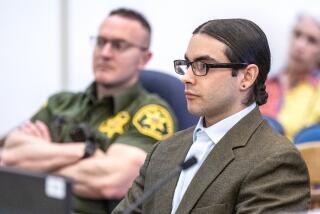Judge Prohibits Use of ‘Freeway Killer’ Theory
- Share via
A Riverside County Superior Court judge ruled Monday that attorneys for the man accused of killing a Costa Mesa boy in 1979 may not present their theory that executed “Freeway Killer” William Bonin committed the crime.
James Crummel reported finding human bones in 1990 off Ortega Highway in Riverside County. Six years later, the remains were identified as those of 13-year-old James “Jamie” Trotter. In 1997, authorities, who had researched Crummel’s past as a convicted sex offender, filed murder and molestation charges against him. He could face the death penalty.
Crummel’s attorneys argued that the slaying could be the work of Bonin, who was executed in 1996 after his conviction for killing 14 young boys in Los Angeles and Orange counties, beginning in August 1979. To support their argument, defense attorneys cited taped jailhouse statements by James Munro, a Bonin accomplice who implicated him in the murder of Trotter.
In his statement, Munro said Bonin told him he had killed Trotter and buried his body. Munro said Bonin showed him a photo of Trotter with a cord wrapped around his neck and went as far as detailing the boy’s hair color and shoe size and noting Trotter’s chipped tooth.
But Munro later disavowed the statements when he testified before Judge Dennis A. McConaghy last week, saying he fabricated them because of his hatred for Bonin.
On Monday McConaghy said he found Munro’s earlier statements “incredible.”
“I don’t know about Munro -- I don’t believe him,” McConaghy said in court. “To believe that Bonin described for him every detail of all of his victims, including the size of [Trotter’s] shoes and the color of his shoelaces, and [for Munro] to then remember that information in extreme detail all these years later -- there’s nothing highly trustworthy” in his testimony, the judge said.
More to Read
Sign up for Essential California
The most important California stories and recommendations in your inbox every morning.
You may occasionally receive promotional content from the Los Angeles Times.














